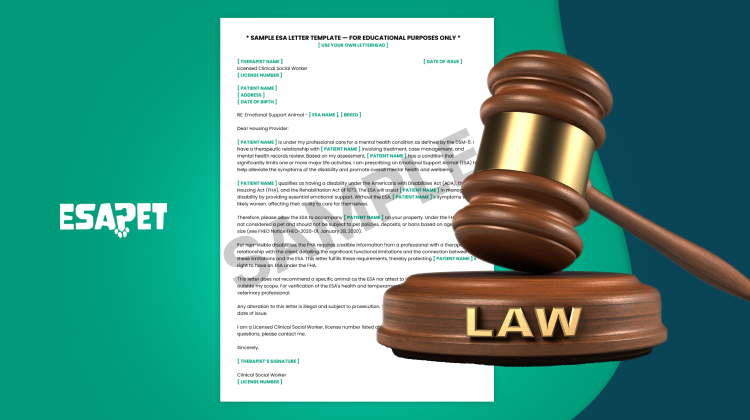Emotional Support Animal Laws: Rights, and Regulations

ESAs help people with mental or emotional disabilities. Awareness of their role is growing, and understanding the laws that protect ESA owners is important. Federal protections offer rights, but state laws can differ. Staying informed on changes is key to protecting your rights.
What is an Emotional Support Animal (ESA)?
An Emotional Support Animal (ESA) is a pet that provides emotional comfort to individuals with mental or emotional disabilities. This disability can be anxiety, depression, bipolar disorder, or PTSD.
Unlike service animals, ESAs are not trained to perform tasks related to a disability. Their main role is to offer companionship, which helps reduce stress and improve emotional well-being. ESAs do not have the same legal access rights to public spaces as service animals.
ESA Definition Under the ADA
Under Title II and Title III of the Americans with Disabilities Act (ADA), ESAs are not considered service animals. A service animal must be trained to perform specific tasks related to a disability. Unlike assistance animals, ESAs lack this training and are not allowed in public spaces.
Emotional Support Animals vs. Psychiatric Service Animals
ESAs and PSDs are often confused, but they serve different purposes. ESAs offer comfort and emotional support to their owners. PSDs are trained to perform specific tasks for individuals with psychiatric disabilities. This difference impacts their training, legal rights, and roles.
PSDs perform essential tasks, such as interrupting harmful behaviors or providing reminders for medication. Unlike ESAs, which don’t undergo such training, PSDs focus on managing specific symptoms. Let’s explore each area further.
Training
PSDs’ training is specialized and designed to meet their handlers’ unique needs, while ESAs don’t have structured training.
Legal Rights
PSDs are protected under the Americans with Disabilities Act (ADA). This law allows them to access most public spaces. They are also covered by the Air Carrier Access Act (ACAA), permitting them to fly in the cabin. ESAs only have housing protections under the Federal Fair Housing Act (FHA).
Purpose
The purpose of a psychiatric service dog is to assist with mental health conditions. ESAs only offer emotional relief but don’t directly address symptoms.
Types of Emotional Support Animals
Different animals can provide emotional support based on individual needs. While dogs and cats are the most common, other animals can also be emotional support companions. The type of emotional support animal depends on the person’s preferences and lifestyle.
Some people may prefer smaller pets for emotional comfort. Some find relief with more unique animals. Each animal offers a different kind of support. Here are some of the most commonly chosen emotional support animals:
 |
Dogs Dogs are the most popular ESAs. They offer companionship and help reduce stress. Their loyalty and ability to bond deeply with their owners make them ideal for providing comfort. |
 |
Cats Cats are often chosen for their calming presence. They’re independent but can form strong bonds. Cats are great for people who need emotional stability but prefer a less dependent pet. |
 |
Small Mammals (Rabbits, Guinea Pigs, etc.) These pets are perfect for those with limited space. Rabbits, guinea pigs, and similar animals are low-maintenance but can offer plenty of emotional support. |
 |
Other Pets (Fish, Birds, Reptiles, etc.) Some people find comfort in less conventional pets. Fish, birds, reptiles, and even insects can provide emotional support. These animals may appeal to those who want a quiet and unique companion. |
ESA Federal Laws and Legal Protections
Federal laws give certain protections to ESA owners. However, these rights are more limited than those of service animals. ESAs are not allowed in public places, but they are covered under the FHA. This act allows owners to live with their ESA even in no-pet housing.
The main laws covering ESAs are the FHA, ACAA, and ADA. The FHA ensures housing rights for ESA owners, while recent changes to the ACAA have restricted ESA access to flights.
Unlike a service animal, ESAs are not covered under the ADA for public access rights. These laws define ESA protections, mainly in housing. These laws define where and how ESAs are protected under federal regulations.
- Fair Housing Act (FHA)
The FHA protects individuals with emotional support animals from housing discrimination. Landlords cannot deny housing because of no-pet policies. They must make reasonable accommodations. - Air Carrier Access Act (ACAA)
ESA air travel rights have changed significantly. Most airlines no longer recognize ESAs as service animals. Under the ACAA, only service dogs can fly in the cabin without extra charges. - Americans with Disabilities Act (ADA)
The Americans with Disabilities Act (ADA) does not recognize ESAs as service animals. ESAs do not have public access rights. They cannot enter most public places like service dogs can.
As a requirement to have an ESA, you need a legitimate ESA letter from a licensed mental health professional. The letter must verify that you have a mental or emotional disability and the ESA is necessary for your treatment. ESA Letters requirements include details like the professional’s license number and contact details.
The Role of Licensed Mental Health Professionals in ESA Certification
An LMHP plays a vital role in certifying an ESA. They assess your mental or emotional disability and determine if an ESA is necessary. Their letter confirms your need for emotional support. Without this letter, your ESA is not legally recognized.
Latest Federal Updates on ESA Laws
Recent updates under the Air Carrier Access Act (ACAA) treat ESAs like pets. The Fair Housing Act (FHA) ensures housing protections. The Rehabilitation Act of 1973, Section 504, requires reasonable accommodations, such as waiving pet fees, for disabled individuals.
Emotional Support Animal Rights Under the Fair Housing Act (FHA)
The FHA protects ESA owners from housing discrimination. Under the FHA, landlords must make reasonable accommodations for individuals with ESAs. Landlords cannot deny housing or charge extra pet fees because of an ESA.
Landlords are required to waive no-pet policies if the tenant provides proper documentation. The FHA ensures ESA owners are treated fairly and have equal access to housing.
Accommodation Rights for ESAs in Different Housing Settings
Federal laws grant emotional support animal (ESA) owners specific rights in housing. These laws ensure they can live with their animals, even where pets are prohibited. Here’s how these accommodation rights apply in three different housing situations:
Rental Properties
The FHA protects renters with ESAs. Landlords cannot deny accommodation due to an ESA. Tenants must provide valid documentation, such as an ESA letter, to qualify for these accommodations.
University Housing
Students with ESAs are also covered under the FHA. Universities must allow students to live with their ESAs. Schools cannot deny housing or charge extra fees due to an ESA. The university must make accommodations as long as the student provides proper documentation.
Public Housing
Public housing programs must accommodate ESA owners under the FHA. ESA owners in federally funded housing are allowed to live with their animals. Public housing authorities cannot charge extra fees.
How to Request Reasonable Accommodations for Your ESA
Requesting reasonable accommodations for your ESA is simple. It starts with proper documentation from a licensed professional. Landlords are legally required to consider these requests under the Fair Housing Act.
Clear communication and valid documents are key to avoiding complications. Understanding your rights and preparing your request properly will help you easily navigate the process. Follow the steps below to ensure your request is successful.
- Step 1: Obtain a Valid ESA Letter
Get an official letter from a licensed mental health professional. This letter should attest that you have a disability and that ESA is included in your treatment plan. - Step 2: Submit Documentation to the Landlord
Send the ESA letter to your landlord with a formal written request. This explains your need for the ESA and asks for reasonable accommodation. - Step 3: Address Any Landlord Concerns
If your landlord has questions, provide more details or documentation. Be ready to explain how the ESA helps you manage your condition. This will ensure clarity and smooth the process.
ESA Housing Local Laws and Regulations
While ESA housing laws vary by state or local laws, they are all covered under the Fair Housing Act (FHA). In California, landlords cannot charge pet deposits. New York ensures landlords can’t reject ESA owners. Oregon offers similar rights but allows denial if the ESA causes property damage.
Local Emotional Support Animal Rental Laws
Local ESA rental laws differ by state and are enforced by local authorities and institutions. Most of them use the FHA as a guide in their own regulations. Almost every difference between them relates to specific requirements and turnaround periods. For example:
- In California, therapists must wait 30 days after the first consultation to issue an ESA Letter, ensuring ESA owners have ongoing psychological treatment. The same is valid for Arkansas and Iowa.
- Florida enforces strict ESA letter requirements, ensuring an ESA is only recognized after handlers get this document.
- In Texas, landlords can only request an official ESA letter. Any other document is not necessary as a requirement to guarantee ESA rights.
- New York requires vaccination proof for some ESAs, ensuring the animal’s physical well-being, and assuring ESAs are correctly handled by their owners.
To see more information in each state, visit our specific page for your area:
Latest Updates on ESA Housing Laws
Under the U.S. Department of Housing and Urban Development (HUD) guidance, breed and weight restrictions do not apply to ESAs. Landlords may deny an animal if it poses a safety threat, causes damage, or imposes an undue financial burden.
ESAs and Air Travel: Rights Under the Air Carrier Access Act
Until 2021, the Air Carrier Access Act (ACAA) protected ESA owners by allowing their animals to fly in the cabin for free. Airlines were then required to treat ESAs like service animals, giving ESA owners the ability to travel with their pets without restrictions.
However, recent changes have altered these rights. Most airlines recognize ESAs as just pets. They are no longer recognized as service animals. ESAs cannot fly free in the cabin, and airlines now only allow trained service dogs to fly for free.
ESA Travel Rights and Limitations
ESA owners now face several limitations when flying, and airlines require additional documentation for ESAs. Most airlines no longer offer free in-cabin access for ESAs, reserving that right for service dogs only. It’s important to check each airline’s policy before booking.
ESA-Friendly Airline Companies
Many airlines no longer offer special status for ESAs. However, ESA-friendly airlines like American, United, Delta, Alaska Airlines, Spirit, Southwest, and Frontier allow small pets to fly in the cabin. However, they must fit in a pet carrier under the seat, with applicable pet fees.
Larger animals must fly in the cargo hold, as allowed by Hawaiian Airlines and Alaska Airlines, which offer climate-controlled cargo options for pets. Always check airline policies and documentation requirements before booking your flight.
ESA Travel Local Laws and Regulations
ESA travel local laws differ across states and cities. Local regulations may limit ESA access to other forms of transport. Some places allow ESAs with proper documentation, while others restrict them. Ride-sharing services like Uber follow local regulations, leaving decisions to drivers.
Latest Updates on ESA Travel Laws and Transportation Regulations
Under the recent changes to the ACAA, ESAs were removed from the classification of service animals. As a result, airlines are no longer required to allow ESAs in the cabin. Most now treat them as regular pets, often charging fees and requiring them to travel as checked baggage.
Emotional Support Animal Laws by State
ESA laws vary across states, even though federal protections exist under the ADA and FHA. In California, AB-468 penalizes businesses selling fake ESA products. A 30-day patient-professional relationship is required before an ESA letter can be issued. This prevents fake ESA claims.
Florida has strict rules for ESA documentation. It requires letters from licensed mental health professionals. Landlords cannot charge pet fees for ESAs. Florida penalizes those trying to pass off pets as ESAs without proper certification.
In Texas, ESA letters must be from professionals licensed within the state. New York allows landlords to request ESA vaccination records. Under HB 703, Montana enforces a 30-day relationship with an LMHP before issuing ESA documentation to prevent misuse.
New ESA Laws for People with Disabilities in the U.S.
Recent updates to ESA laws aim to address widespread concerns over fraud and misrepresentation. The Air Carrier Access Act (ACAA) was revised recently, removing ESA rights to fly freely.
New regulations prevent ESA fraud while ensuring fair treatment for individuals with needs. States have introduced stricter documentation rules, requiring a legitimate relationship with an LMHP. These updates aim to curb misrepresentation and protect people with disabilities.
How to Keep Up with Changing ESA Laws
To stay informed about ESA law updates, subscribe to newsletters from the HUD or legal organizations. Regularly check legal blogs that cover ESA laws. Consult with legal experts, especially for state-specific rules. Join ESA communities online to get real-time updates.
ESA Registration and Certification
There is a difference between ESA registration and certification. ESA certification is crucial for legal protection under housing laws. ESA registration is not required but can be helpful. It may add convenience when dealing with landlords, though it does not grant legal rights.
How to Obtain a Legitimate ESA Certification
You need a letter from an LMHP to get an ESA certification. The letter must confirm that you have a mental or emotional disability and need the ESA as part of your treatment. It should include the professional’s license number, signature, and contact details.
Recognizing Fraudulent ESA Claims and Consequences
Making fraudulent ESA claims can lead to serious consequences. Falsely claiming an animal as an ESA is illegal. It may result in fines, eviction, or even lawsuits for misrepresentation. Always obtain legitimate certification to avoid legal risks.
Know Your Rights as an ESA Owner
As an ESA owner, you are protected under federal and state laws. The Fair Housing Act (FHA) ensures you can live with your ESA. Understanding these rights is crucial to avoid discrimination.
It’s also important to know your legal protections vary by location. While federal laws provide a strong foundation, some states may have stricter regulations. Knowing your rights helps you ensure proper accommodations for your ESA.
When Can a Landlord Legally Reject an ESA in Specific States?
A landlord can reject an ESA if the animal threatens others, causes property damage, or violates local laws. They may also deny the ESA if you don’t provide proper documentation. Always ensure you have a valid ESA letter to support your claim and avoid legal issues.
ESA Legal Rights in Public Places
ESAs do not have full public access rights under the ADA. They are not allowed in public places like restaurants or stores. However, depending on the airline’s policies, ESAs can go with their owners in housing and sometimes during air travel. Always check the rules before booking.
Filing a Complaint for ESA-Related Issues
Knowing how to file a complaint is essential if your rights as an ESA owner are violated. You have legal protections under federal and state laws. Whether it’s against an ESA handler or a landlord, there are clear steps you can take.
Filing complaints helps ensure your rights are respected. Different situations require different approaches. Below is a guide on how to handle complaints related to ESA violations.
- Filing a Complaint Against ESA Handlers
You can report the issue if an ESA handler violates legal or ethical responsibilities. Start by documenting the violation and gather any supporting evidence. You can then submit a formal complaint to agencies that regulate animal services. Be clear and specific about the incident. - Filing a Complaint Against Landlords
If a landlord unlawfully denies housing for your ESA, you have options. First, document the refusal and gather any communication as evidence. Then, file a formal complaint with the U.S. Department of Housing and Urban Development (HUD) or your local fair housing agency.
Filing ESA Complaints with Relevant Authorities
You can file complaints about ESA with federal and state authorities:
- For housing issues, contact the U.S. Department of Housing and Urban Development (HUD). They handle complaints under the Fair Housing Act.
- For airline concerns, contact the U.S. Department of Transportation (DOT). They enforce the Air Carrier Access Act.
- On the state level, you can file with your state’s Attorney General’s office. Some states also have a human rights commission or consumer protection agency.
These agencies help with rights and protections involving ESAs.
Frequently Asked Questions About Emotional Support Animal Laws
What Are the New Federal Rules on Emotional Support Animals?
The recent changes to the Air Carrier Access Act (ACAA) limit ESA travel rights. Airlines now only permit trained service dogs to travel without extra fees. ESAs must travel as pets, subject to fees and restrictions.
Under the FHA, ESA protections remain for housing, but stricter documentation is required. ESA owners must provide a valid ESA letter from an LMHP. While breed restrictions are not mandated, landlords can deny animals that pose safety risks or cause property damage.
Do Landlords Have to Accept Emotional Support Animals?
Yes. Under the Fair Housing Act (FHA), landlords generally must allow ESAs, even in no-pet housing. ESAs cannot be denied solely due to a no-pet policy. Landlords may request a valid ESA letter from a licensed mental health professional.
However, they cannot charge pet fees or deposits for ESAs. If the animal directly threatens others or causes significant damage, landlords can legally reject it.
Can You Say No to an Emotional Support Animal?
Yes. A landlord or business owner can refuse an emotional support animal. If the animal threatens the health or safety of others, the owner can deny it. This also applies if the animal causes property damage.
The tenant must provide proper ESA documentation, like a letter from a licensed mental health professional. Public places do not have to accept ESAs, as they are not protected under the ADA. Housing follows the FHA rules, which have different standards.
Can a Landlord Charge Pet Fees for an ESA?
No. Under the Fair Housing Act (FHA), landlords cannot charge pet fees for an ESA. This law ensures that individuals with ESAs are not financially burdened by pet fees when renting housing.
However, while pet fees are waived, tenants are still responsible for any damages caused by their ESA. Landlords can hold tenants accountable for property damage or excessive wear and tear caused by the animal.
What Documentation Is Needed for an ESA?
To qualify for an ESA, the owner must provide a valid letter from an LMHP. This letter must state the individual’s need for an emotional support animal due to a mental or emotional condition. It should also include the professional’s credentials and contact information.
The letter must be current and signed by a licensed mental health professional. Without this documentation, landlords are not required to accommodate an ESA.
What Is the New Law for Emotional Support Animals in My Area?
To learn about ESA laws in your area, research state-specific legislation. Each state may have its own rules on emotional support animals. You can check official state websites or contact local housing authorities for information. Laws may change, so staying informed is crucial.
Some states may impose extra requirements beyond federal laws. These could include specific documentation or restrictions on certain animal breeds or sizes. Consulting with a legal professional can help ensure you meet all local regulations.
What Airlines Still Accept Emotional Support Animals?
Most U.S. airlines, including American, United, Delta, Alaska Airlines, Spirit, Southwest, and Frontier, now treat ESAs) as regular pets. They no longer grant special accommodations for ESAs and often need them to follow the same rules and fees as other pets.
Some airlines, such as Hawaiian Airlines and Alaska Airlines, offer alternatives for larger ESAs. They allow ESAs to travel in climate-controlled cargo holds. Always check with the airline for specific policies, which can vary and require strict documentation.
How Can I Stay Informed About Changing ESA Laws?
Regularly check federal, state, and local regulations to stay updated on ESA laws. The Department of Housing and Urban Development (HUD) and the Department of Transportation provide official updates.
It’s also helpful to join ESA-related communities or forums. Members often share updates on changing laws and personal experiences. Consulting legal professionals is another way to ensure you have the latest information, especially for local regulations.
Conclusion
ESA owners have key legal protections under laws like the FHA and the ACAA. They must understand their legal rights, as these protections help prevent discrimination. However, with laws constantly evolving, staying informed about federal and state changes is essential.
For those needing assistance with ESA documentation or certification, ESA Pet is here to help. Stay ahead by ensuring your ESA is properly certified and legally protected. Contact ESA Pet for professional guidance on navigating the latest ESA regulations.









